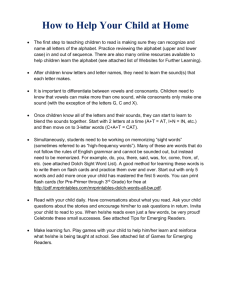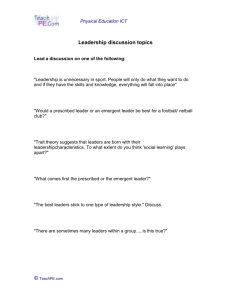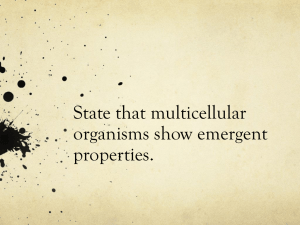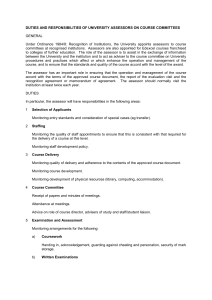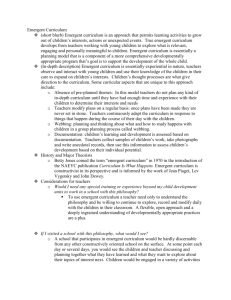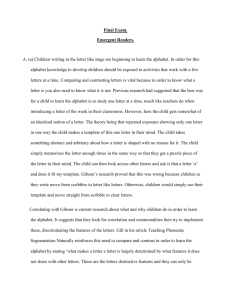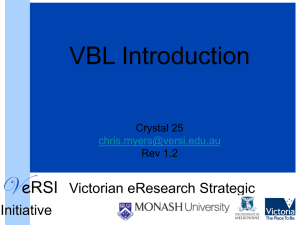Emergent
advertisement
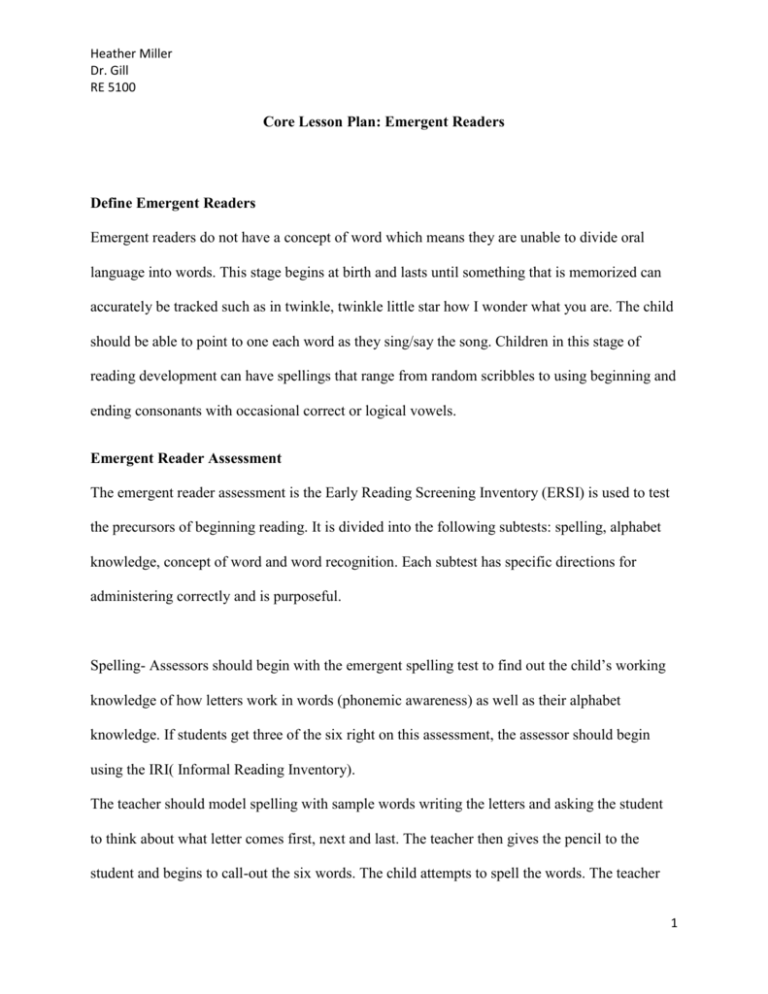
Heather Miller Dr. Gill RE 5100 Core Lesson Plan: Emergent Readers Define Emergent Readers Emergent readers do not have a concept of word which means they are unable to divide oral language into words. This stage begins at birth and lasts until something that is memorized can accurately be tracked such as in twinkle, twinkle little star how I wonder what you are. The child should be able to point to one each word as they sing/say the song. Children in this stage of reading development can have spellings that range from random scribbles to using beginning and ending consonants with occasional correct or logical vowels. Emergent Reader Assessment The emergent reader assessment is the Early Reading Screening Inventory (ERSI) is used to test the precursors of beginning reading. It is divided into the following subtests: spelling, alphabet knowledge, concept of word and word recognition. Each subtest has specific directions for administering correctly and is purposeful. Spelling- Assessors should begin with the emergent spelling test to find out the child’s working knowledge of how letters work in words (phonemic awareness) as well as their alphabet knowledge. If students get three of the six right on this assessment, the assessor should begin using the IRI( Informal Reading Inventory). The teacher should model spelling with sample words writing the letters and asking the student to think about what letter comes first, next and last. The teacher then gives the pencil to the student and begins to call-out the six words. The child attempts to spell the words. The teacher 1 Heather Miller Dr. Gill RE 5100 copies the words as the child writes on the scoring sheet. If the child fails to use beginning consonants the spelling test can be stopped. Alphabet Knowledge-The child’s ability to recognize and write letters of the alphabet are tested in this subtest of the ERSI. This test is divided into alphabet recognition and alphabet production. The assessor points to random letters of the upper and lower case alphabet and asks the child to point to them in the recognition part of the test. During the production part of the test, the assessor dictates the names of the letters randomly and has the child to write them. To score these, the assessor should write down the letters the child does not get and how quickly the child is able to identify the letters and give the child credit for writing the upper case or lowercase letter. Concept of Word-This assessment tests the child’s ability to match spoken words to written words. The test begins with the assessor doing a picture walk for the text, Katie and finger pointing to each word as it is read. The child is also asked to finger-point as they say the sentence that was just read. Once this task is finished, the child is asked to identify at target word in the sentence after it is called out by the assessor. The assessor should fill out the score sheet after each of the four sentences and target words are completed. Finger-pointing is scored with a + if the child read each word in the sentence correctly and a 0 if they are unable to accurately fingerpoint. Assessors will also write the child’s responses to the target words for each sentence. Word Recognition- The assessor asks the child to read 10 words from the ERSI. The first five are 2 Heather Miller Dr. Gill RE 5100 high frequency words while the remaining words are words that have regular grapheme to phoneme correspondences (can be sounded out.) The assessor writes the child’s responses and notes if the child used the appropriate strategies for reading the words. I will use a student I am tutoring privately to demonstrate how this knowledge will inform instructional practices. I’ll call him D. I began administering the emergent spelling assessment to D to find out what he knew about the way letters work in words. It became obvious; he was not a beginning reader when he was able to accurately spell the words feet, jump, and dig. For all of the words, he was able to use the correct beginning and ending consonants. I could have ended the test here, however I chose to see if D was able to track “Katie is walking in the rain.” He was able to do this with 100% accuracy and he was able to identify all of the target words. D is not an emergent reader, so I should begin assessing using the Informal Reading Inventory. Lesson Plan Reading-Emergent readers need to practice tracking during guided reading using texts that are memorized through echo and choral reading. Pattern books, dictated stories, poems, rhymes and songs are easily memorized and have few words on the pages so that students can easily track as they point to the words and read. If I had emergent readers in my classroom, I would put familiar text on the wall at their eye level so they could practice pointing to the correct words. Students will be reading at this stage until they can accurately track. Writing-Emergent readers need practice writing stories about what they know about, such as experiences they have had or what they have seen. Writing instruction needs to be 30% of the time spent during a daily language arts block. The child should have opportunities to dictate their 3 Heather Miller Dr. Gill RE 5100 stories to an adult as well as have practice writing for themselves. After emergent readers write a line, an adult should write the line correctly beneath the child’s writing so that children can test and check their hypothesis about the way in which words work. Word Study-Word study lessons need to be based on the goal of students learning beginning and ending consonants. Pictures should be sorted based on the first sound and last sound in a word. Before children are able to be successful with sorting pictures based on beginning and ending consonants, they need to have mastered the alphabet letters. It is important for students to be able to identify beginning consonants so they can begin to use this knowledge to help them track text. Being Read to- Being read to is important for children at any stage of learning to read. However, reading aloud to children while they are in the emergent stage is of the upmost importance, because, they develop a sense of story and are introduced to book language. Texts should be appropriate for the child’s age and should be filled with rich vocabulary. 4
